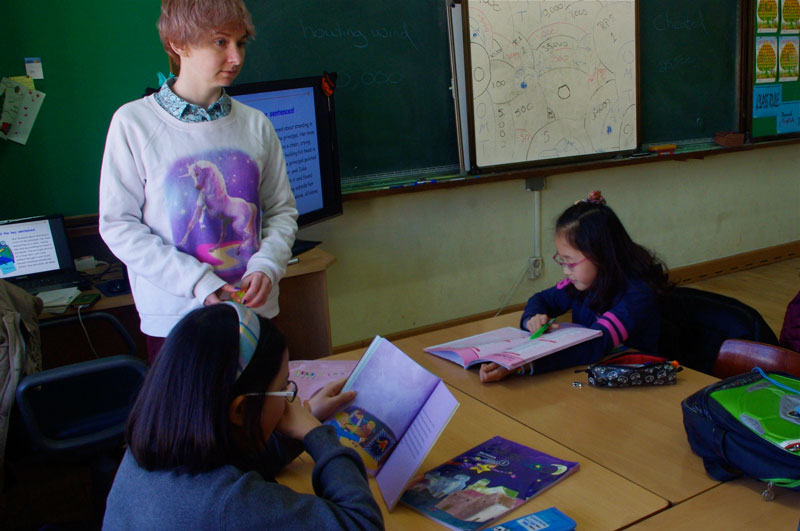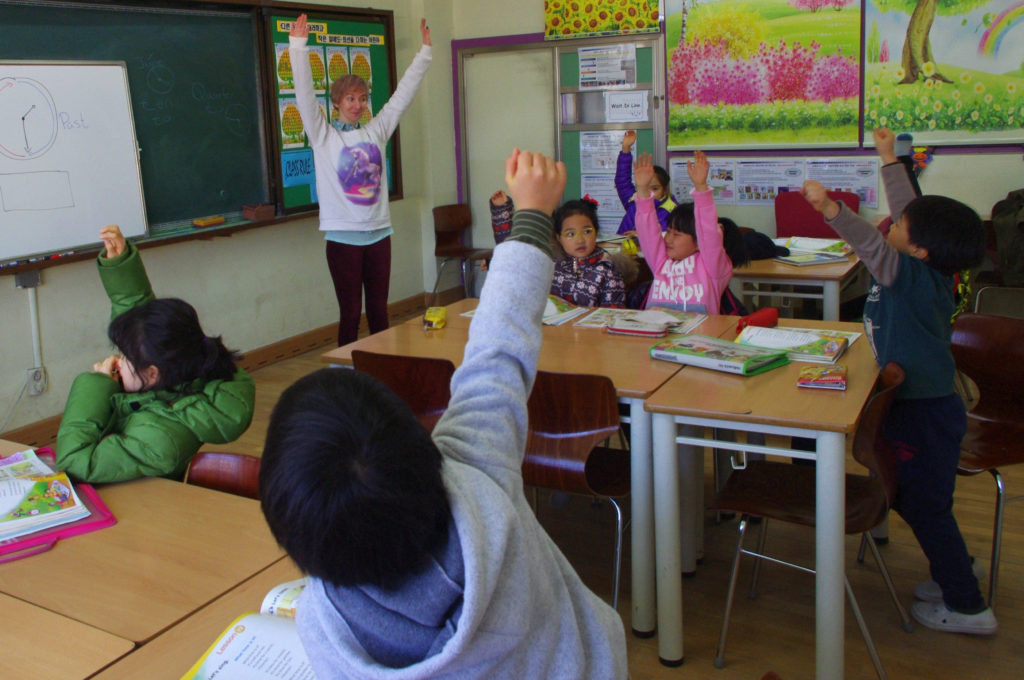Miranda’s Great Adventure

As an ESL teacher living in Korea I have a particular skill set. I’m a pro with band-aids. I can fix anything with twine and glue. I can break out into song and dance about any topic based on the daily lesson, be it weather, counting, clothes, household rooms, or colors. My charades skills have no equal. If you think a crying child is impossible to handle, you have simply not applied enough stickers. An average day for me involves blood, tears, and loose teeth.
The ability to teach anything involves the ability to plan, schedule, coordinate large groups of people, and above all, maintain a level head in the face of madness. A teacher must be aware of themselves at all times within the classroom. A teacher can hold the attention of a classroom full of children while working their way through triathlon of structured activities and lessons. In a day I run a marathon. I can tell you exactly what I will be doing in five-minute increments while at work. I have back up lessons for each class and one completely alternate lesson for absolutely crazy days.

But where does the sociological aspect come in to play? Teaching in a foreign country demands you learn the culture, the language, the diet, the walk, and the dress of that country before you can even begin to teach. Korean children cannot be understood without first understanding their parents. Korean parents cannot be understood without understanding their parents.
Korea’s crazy push into a high-tech and modern world of cheap soju and crazy love motels has everything to do with how one should approach teaching in Korea. I’m in charge of socializing children on both Korean behavior and American behavior. I must choose what words my kids learn, the slang they should pick up, and the attitude they assume within my classroom. I’m not allowed the luxury of simply asking “what” of Korea, I must always ask “why” as well.
Teaching English allows me to really examine the role of language as both a barrier between societies, as well as a dynamic and fluid structure within societies. I must constantly explain why I say ‘knock it off’ when I don’t want them to remove things from their desk, or why English speakers say ‘hang up’ the phone when children have only known cell phones can put a lot into perspective. Tell a child they are eating gummies instead of jellies in Korea and — surprise! — you have just told them they are eating spiders. Jokes simply do not translate between languages and puns are doomed from the start.
Coming to Korea allowed me to step into a complete unknown and structure myself. I go to the gym, volunteer at a homeless shelter twice a week, participate in several writing based groups in Seoul. I keep a detailed schedule of my weeks and I hold myself to those commitments. I don’t flinch at Korea’s more creative meals, and I can navigate the Seoul metro in my sleep. I visit museums, I still go on tourist tours of Korea, and I travel to surrounding countries whenever possible.
So much of my time in Korea has been spent working to simply understand Korea. I have come to love the idea of ‘couples attire’ and ajumma and ajushi privilege. I will forever crave kimchi with my meals. I know the lyrics to several kpop songs, and when I visit the doctor it costs less than my morning coffee.
This is my last year teaching. This is also my last year in ROK. I will miss everything about my time here, but I also acknowledge that I am ready to move on. Traveling for me is all about learning to fall in love with uncomfortable bedfellows. It means reevaluating what I know to be correct. I went to the Philippines last year for vacation and wound up staying in Manila and volunteering in a program for feeding and clothing homeless children in the streets. I spent Christmas cooking a meal for over 200 people. Life is funny and fickle and sometimes you wind up eating silkworm pupa and finding it tastes pretty darn good.
Miranda Joy graduated from Wheaton College in 2012 with a degree in sociology. She participated in the Bhutan program where she worked with the city municipalities as well as the UN in trash collection and coordination. She has been an ESL instructor in Korea since 2012, and – guess what? — you can find out the meanings of unfamiliar terms by some online exploring.
-
Categories:
- Sociology